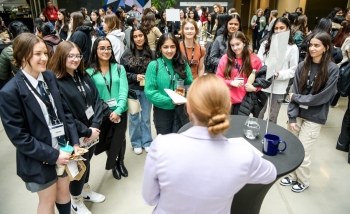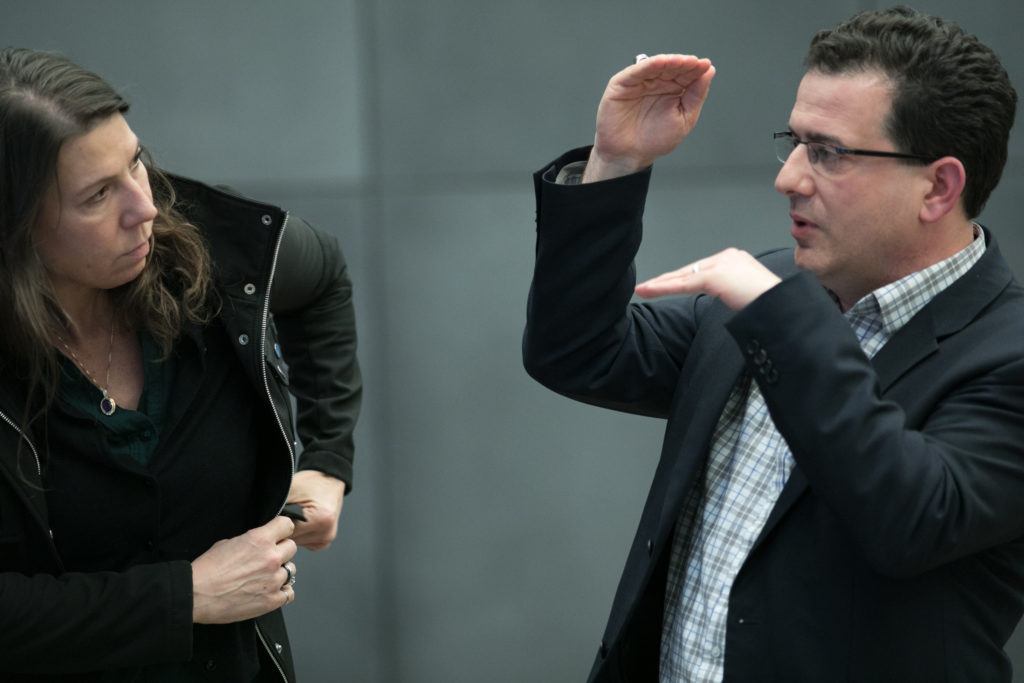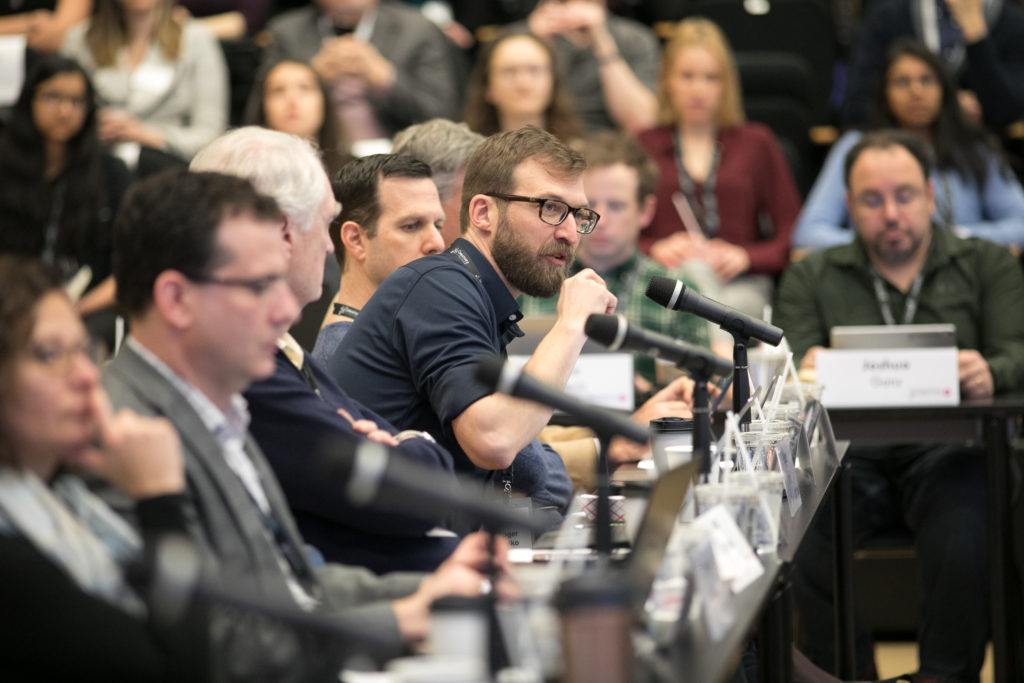In the global race to turn quantum science into a technological revolution, a small but bustling group of entrepreneurs are tying their laces and limbering up.
These start-up founders have ideas, enthusiasm, expertise, and the attention of potential investors. They want to capitalize on emerging science and turn new techniques into workable – and profitable – practices. They also, however, face one serious hurdle: quantum science itself. Do the capabilities exist yet for their ideas to be put into practice, or are these early adopters just chasing rainbows?
That question lies at the heart of a Toronto-based program that is applying the “fail fast” ethos of the start-up scene to applications in quantum science. The union could prove more powerful than the sum of its parts, say two Waterloo physicists whose involvement in the program helps sort the quantum wheat from the chaff.
Perimeter Associate Faculty members Michele Mosca and Roger Melko are Chief Scientists at the Creative Destruction Lab (CDL), a Toronto-based mentoring program that launched in 2012. Last year, CDL introduced the world’s first program for start-ups seeking to exploit quantum machine learning.
Michele Mosca speaks with CDL Fellow Sally Daub at the April meeting. (Photo: Betty Want/CDL)[/caption]
Mosca (an expert in cryptography and quantum algorithms) and Melko (the Canada Research Chair in Computational Many-Body Physics) bring expertise rarely seen in the start-up space. Along with other chief scientists, they assess the technology behind CDL start-ups, consult with the entrepreneurs, and advise the investors. It’s an unusual milieu for theorists, but one they believe will have payoffs for both research and industry.
“No-one has really worked hard on the business-use-cases for quantum computation. For theorists, that’s not what we do,” said Mosca, co-founder of the Institute for Quantum Computing at the University of Waterloo.
“We’re reaching the critical point now where devices might be available, and some early prototypes are available. Of course we need people to keep doing the fundamental stuff – I definitely enjoy doing that – but I’m also enjoying playing a role in translating it, and helping it have positive economic impact.”
By coming up with ideas and applications, start-up founders are not only pushing current technology to its practical limits, but also shaping what technology succeeds and what doesn’t. It’s akin to the 1980s videotape format wars, which saw VHS and Betamax battle it out for consumer supremacy: if a quantum hardware company can’t meet the demands of industry, it likely won’t survive. And that, according to Melko, is valuable.
“That helps light the way towards what industry will actually want or need,” said Melko, who is also cross-appointed at the University of Waterloo. “How do you know an approach is going to work? This is how you know. You get a group of start-ups, and they just try it.”
The nimbleness of early-stage companies makes them more free to explore beyond the standard paradigms of quantum computing. As hardware companies unveil “near-term” devices, start-ups will rapidly probe what the devices are actually good for. “The start-ups will bring a ton of imagination into the game,” he said.
Such an approach inevitably leads to a lot of failure. Ideas won’t pan out. A technically excellent product might have little or no commercial traction. A strong-looking business plan can be based on unsound science.
The fail-fast ethos of the tech world doesn’t often cross into the realm of academia, but at CDL, the fledgling entrepreneurs – many of whom are scientists – feel the heat every eight weeks.
In the hot seat
The scene inside the University of Toronto Rotman School of Management was bright and energetic for CDL’s April meeting.
At the top of a hot-pink staircase, people chatted between a coffee bar, dairy-free berry smoothies, a host of morning snacks, and jars of candy. There was a feeling of promise in the air, as well as tension. Everyone knew that some companies would be going home today.
The day starts with small-group meetings. Chief scientists and advisors meet with founders to discuss specific issues. The sessions are short and direct. (Timekeepers make sure of it, holding countdown cards at the office windows.)
In one of the small offices, Melko joined three other advisors: Peter Wittek, Academic Director of CDL’s quantum machine learning program; Abraham Heifets, founder of Atomwise and a CDL alum; and theoretical astrophysicist Chiara Mingarelli. Discussions ranging from qubit compression mechanisms to funding strategies.
During a break, the advisors chatted about the challenges these start-ups face. Most incubators face issues of technology and scale, but for companies aiming to harness the capabilities of quantum machine learning, says Heifets, the stakes are even higher. “Really, your competition here is the universe, and getting anything to work,” he said.
In the afternoon, attendees gather in a large lecture theatre. The floor is occupied by dozens of CDL Fellows and Associates – investors, venture capitalists, scientists, and business advisors – seated in two concentric semicircles. Together, the people in the room represent or manage between $2 billion to $3 billion in wealth.
Roger Melko assesses a start-up at the Creative Destruction Lab meeting in April. (Photo: Betty Want/CDL)[/caption]
One by one, the founders present their recent progress, receive feedback, and set goals for the coming eight weeks. Despite the international attendance, it’s a particularly Canadian kind of hot seat: discussion is bright and leans towards the positive, criticism often followed by advice. Everyone is looking for the hidden gem, the fledgling company that could become a business superstar.
At the end of the day, all founders leave the room. The investors and successful entrepreneurs – many of whom have flown in from the United States and Europe for the two-day gathering – offer to lend expertise and advice to start-ups they think are most promising.
This is crunch time: if a company’s name is called and no hands go up, that start-up is culled from the program.
CDL’s Quantum Machine Learning stream began with technical training in QML techniques in August, 2017. Thirty-five companies made it through. Five of those were pre-existing companies; the rest applied for CDL funding. Only 20 of them received investment.
A cohort of 25 attended the first CDL session in October. By April, that was down to 15. At the end of the second day of meetings, two more went packing.
Such a process is abrupt but effective: Wittek said that three of the original companies were all aiming to do the same thing. Only one made it through the first meeting.
A new paradigm
The high-stakes environment feels a long way from the collaborative lunches and chalkboard discussions of academia, but Melko sees it as a potential launch-pad for a new kind of model linking academia and industry. And now could be the perfect time for it.
While robust, fault-tolerant quantum computers are still years away, a new “in-between” era is starting to take shape. Caltech professor John Preskill describes these near-term technologies as “Noisy Intermediate-scale Quantum (NISQ) technology,” where quantum computers with 50 to 100 qubits will be able surpass classical computers, but will be constrained from further growth due to noise.
Exploiting that emerging stage will require more than the usual theory/experiment duality, Melko said. “What are these devices good for? Since they are hard to study theoretically, a fail-fast approach could bring a more efficient paradigm,” he said.
“Entrepreneurs can test out their best ideas for harnessing a quantum advantage, and the metric for success is a demonstrated business case. A successful start-up may then spur new NISQ hardware ideas.
“It’s a rapid innovation cycle that could only happen here, by partnering Waterloo’s quantum expertise with Toronto’s business power. The fact that it is ‘quantum’ is the icing on the cake.”
At least one CDL founder is relishing the idea of pushing that line. Chris Mitchelitis studied condensed matter physics at the University of Waterloo before co-founding Solid State AI, a start-up that applies unique machine learning techniques to sparse data sets.
“It is extremely difficult to create a company that harnesses quantum machine learning in its idealized case at the moment due to the nascent state of quantum computing hardware,” he said via email.
“As the hardware improves, it will become easier to make things work, and therefore easier to define useful advancements over classical solutions. I strongly believe that quantum computing will create a strong differentiator for start-ups in the near future.”
For Mosca, who is also the co-founder of two start-ups, having a commercial counterpoint to Waterloo’s theoretical and experimental expertise could strengthen quantum science for the country.
As he sees it, Canada was an early leader in quantum theory, but bigger countries are investing heavily in what is expected to be the next technological revolution. If Canada is to have a place in the land of quantum opportunity, start-ups like those at CDL could be the ones racing out of the gate to stake an early claim.
“Twenty years ago, we knew there was potential here and we were building the potential,” Mosca said. “Now it’s show time. We use it or lose it.”
Further exploration
About PI
Perimeter Institute is the world’s largest research hub devoted to theoretical physics. The independent Institute was founded in 1999 to foster breakthroughs in the fundamental understanding of our universe, from the smallest particles to the entire cosmos. Research at Perimeter is motivated by the understanding that fundamental science advances human knowledge and catalyzes innovation, and that today’s theoretical physics is tomorrow’s technology. Located in the Region of Waterloo, the not-for-profit Institute is a unique public-private endeavour, including the Governments of Ontario and Canada, that enables cutting-edge research, trains the next generation of scientific pioneers, and shares the power of physics through award-winning educational outreach and public engagement.
You might be interested in




